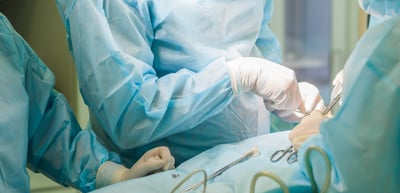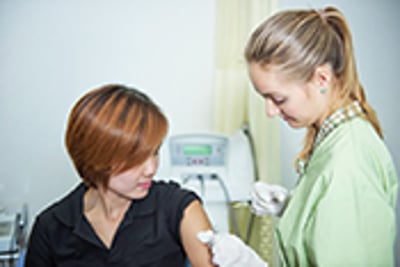Categories Prevention



Relevance: Medium-High
Most relevant for: Young high risk women
Study: Take your time, follow your heart: strategies for communication about family planning
When a woman is newly diagnosed with a BRCA mutation, she faces many risk management decisions. Although many of these decisions impact family planning, little guidance is available on how to communicate this information. This study examines female previvors’ advice on effective strategies for discussing family planning decisions. (03/28/18)
READ MORE ›


Relevance: Medium-High
Most relevant for: Breast cancer patients who are considering or have had a nipple sparing mastectomy
Study: What is the risk of breast cancer recurrence after nipple-sparing mastectomy?
Nipple-sparing mastectomy (NSM) offers better cosmetic results for women who have immediate breast reconstruction (at the same time as their mastectomy). Over the past decade, NSM has gained popularity among surgeons and patients. Studies show that women who keep their own nipples have higher rates of satisfaction and psychological well-being after mastectomy and reconstruction compared to women who lose their nipples. However, little data exists on the long-term risk of recurrence following NSM. New research adds to a growing body of evidence suggesting that risk of recurrence is low after NSM in carefully selected patients with breast cancer. (1/25/18)
READ MORE ›


Relevance: High
Most relevant for: African American women who would like to lower their breast cancer risk
Study: Alcohol and breast cancer risk in African American women
The link between alcohol intake and breast cancer is well known, but most studies have involved only White women. Recently, a large study of more than 22,000 African American (AA) women found that similar to White women, increased alcohol consumption is associated with a greater risk of breast cancer. (10/27/17)
READ MORE ›


Relevance: Medium-High
Most relevant for: Any woman concerned about her risk for breast cancer
Article: Can lifestyle changes impact breast cancer risk?
A recent New York Times article shared how “adopting protective living habits” could help keep breast cancer “at bay”. While many of these lifestyle changes and strategies like not smoking, avoiding weight gain, reducing alcohol consumption, eating a heart-healthy diet, and increasing physical activity have been shown to reduce breast cancer risk, there are other risk factors that one cannot control such as having a BRCA or other mutation that significantly increases breast cancer risk. Importantly, no one strategy has been proven to totally eliminate breast cancer risk. However many of these approaches have overall health benefits. (9/21/2017)
READ MORE ›


Relevance: Medium-High
Most relevant for: Women at average risk for breast cancer
Study: Does aspirin lower a woman’s breast cancer risk?
Women who take aspirin regularly may have a reduced risk of breast cancer. However, previous studies have reported mixed results. Few of these studies have looked at whether this potential benefit of aspirin is linked to specific types of breast cancer. This study found a small reduction in breast cancer risk for women who took a low-dose aspirin at least three times per week, but only for one subtype of breast cancer. Women who took aspirin were less likely to develop ER/PR-positive, Her2- negative breast cancer, the most common type of breast cancer. This study found no breast cancer risk reduction for women who used regular-dose aspirin or other nonsteroidal anti-inflammatory drugs (NSAIDS). (8/29/17)
READ MORE ›


Relevance: Medium-Low
Most relevant for: High risk women who have not had breast cancer
Article: Report on vaccines to prevent hereditary cancer
On 05/30/2017, Good Morning America aired a segment entitled “Can a vaccine help prevent breast cancer at its earliest stages?” The story outlines the need for cancer prevention and hints at early research into a cancer vaccine. (8/1/17)
READ MORE ›


Relevance: Medium-High
Most relevant for: Adolescent and young adult women
Study: Diet during teen years and early adulthood is linked to breast cancer risk
During teen years, breast tissue grows rapidly in young girls and is more likely to be harmed by substances that are known to cause cancer. Few studies have looked at the relationship between diet during puberty and breast cancer risk. This study looks at how a woman’s diet during their teenage years and early adulthood is associated with breast cancer development later in life. (6/30/17)
READ MORE ›


Relevance: High
Most relevant for: People diagnosed with or concerned about their risk for cancer
Article: FDA busts myths of preventing and treating cancer by eating apricot kernels, herbs, and other ingredients
Maggie Fox (NBC News) writes about a new FDA report that warns of 14 "fraudulent” cancer products claiming to either cure or treat cancer (1). The companies that sell these products claim that many of them also prevent cancer, but are they safe or effective? (6/26/17)
READ MORE ›


Relevance: Medium
Most relevant for: People interested in genetic testing for an inherited mutation
Study: Angelina Jolie spoke out on BRCA testing: Did genetic testing increase?
Angelina Jolie published an editorial in the New York Times in 2013 about her choice to have a double mastectomy after finding out she was positive for a BRCA1 mutation. Researchers from a recent study claim that her celebrity endorsement of BRCA testing may have missed its target audience (previvors), due to the increase in BRCA testing following publication of the editorial but a decrease in the number of mastectomies performed. However, the study failed to take into account that many women without breast cancer do not pursue mastectomy in the months following genetic testing. (1/4/17)
READ MORE ›


Relevance: Medium-High
Most relevant for: Woman who are facing mastectomy
Article: After mastectomy: reconstruct or not?
Today, more women know they can have breast reconstruction after removing their breasts for cancer treatment or risk reduction. But what about choosing not to undergo reconstruction? Roni Caryn Rabin writes about the experiences of women who decide against reconstruction in her New York Times piece “‘Going Flat’ After Breast Cancer.” (12/14/16)
READ MORE ›